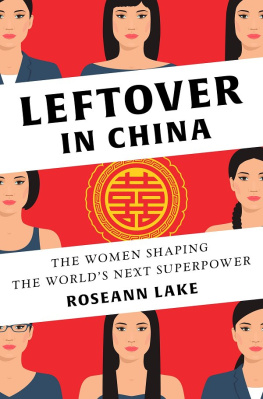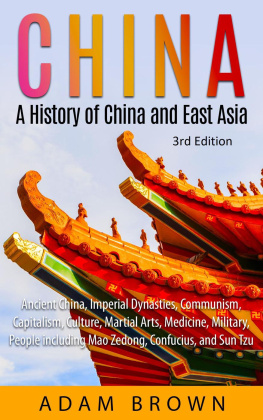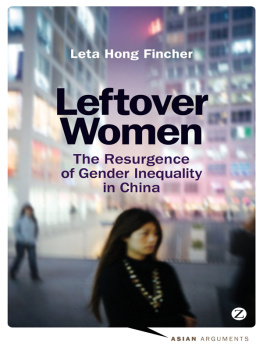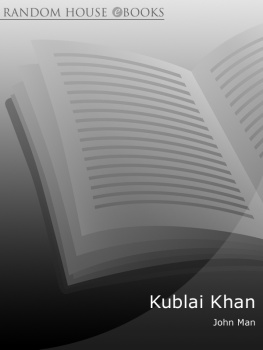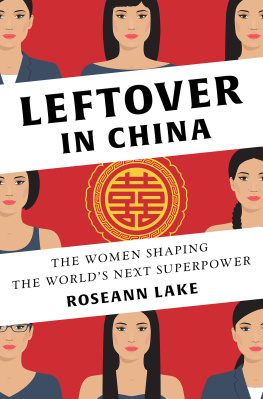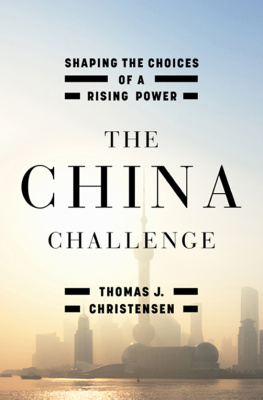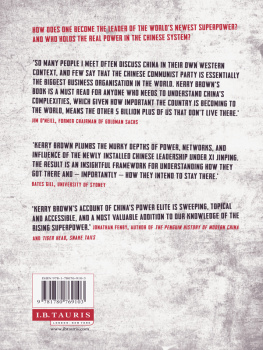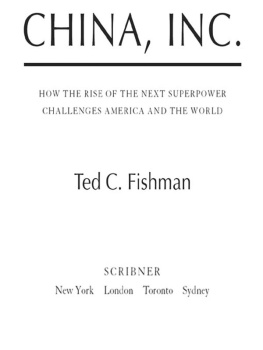Lake - Leftover in China: the Women Shaping the Worlds Next Superpower
Here you can read online Lake - Leftover in China: the Women Shaping the Worlds Next Superpower full text of the book (entire story) in english for free. Download pdf and epub, get meaning, cover and reviews about this ebook. year: 2018, publisher: Norton & Company, Incorporated, W.W, genre: Detective and thriller. Description of the work, (preface) as well as reviews are available. Best literature library LitArk.com created for fans of good reading and offers a wide selection of genres:
Romance novel
Science fiction
Adventure
Detective
Science
History
Home and family
Prose
Art
Politics
Computer
Non-fiction
Religion
Business
Children
Humor
Choose a favorite category and find really read worthwhile books. Enjoy immersion in the world of imagination, feel the emotions of the characters or learn something new for yourself, make an fascinating discovery.
- Book:Leftover in China: the Women Shaping the Worlds Next Superpower
- Author:
- Publisher:Norton & Company, Incorporated, W.W
- Genre:
- Year:2018
- Rating:5 / 5
- Favourites:Add to favourites
- Your mark:
- 100
- 1
- 2
- 3
- 4
- 5
Leftover in China: the Women Shaping the Worlds Next Superpower: summary, description and annotation
We offer to read an annotation, description, summary or preface (depends on what the author of the book "Leftover in China: the Women Shaping the Worlds Next Superpower" wrote himself). If you haven't found the necessary information about the book — write in the comments, we will try to find it.
Lake: author's other books
Who wrote Leftover in China: the Women Shaping the Worlds Next Superpower? Find out the surname, the name of the author of the book and a list of all author's works by series.
Leftover in China: the Women Shaping the Worlds Next Superpower — read online for free the complete book (whole text) full work
Below is the text of the book, divided by pages. System saving the place of the last page read, allows you to conveniently read the book "Leftover in China: the Women Shaping the Worlds Next Superpower" online for free, without having to search again every time where you left off. Put a bookmark, and you can go to the page where you finished reading at any time.
Font size:
Interval:
Bookmark:
LEFTOVER IN CHINA

THE WOMEN SHAPING
THE WORLDS
NEXT SUPERPOWER
ROSEANN LAKE

For my dear parents, Rosa and Ken
it doesnt look like Ill ever become an ophthalmologist,
but I hope this makes you proud.
For Steven Lakethe little brother like no other.
Os quiero!
CONTENTS
Just after Chinese New Year, I returned to the office of the Beijing television station where I had been working to find that all of my usually chipper young female colleagues were in decidedly different spirits. Even Shan Shan, the megawatt producer, had toned it down several joules and was uncharacteristically mum for a Monday morning. Did everyone have a nice holiday? I asked. I got a few unenthusiastic nods, a few forced smiles, and was handed a half-eaten bag of sesame balls that had been circulating around the newsroom. Puzzled, I went to see one of the network supervisors, a woman who was about ten years older than most of the women on staff. They are sad because they are not getting married, she said, as if this answer would make perfect sense to me. She then turned back to her computer, leaving me to wonder if Chinas answer to Mr. Darcy was coming to town, or if the Communist Party had just issued millions of free honeymoons to the Maldives.
Sitting down to lunch with Shan Shan later that day, I learned that Chinese New Year is famous for being the time of year when red envelopes are stuffed, dumplings are steamed, and singletons skewered. As the grand apotheosis of the Chinese lunar calendar and the longest yearly holiday that most Chinese workers are entitled to, its heralded by the mass migration of over 300 million people traveling home to feast and set off fireworks with their families. Yet as extended clans unite to eat, drink, play, and be merry, tidings of betrothals commonly take center stage. Gathered around tables festooned with fish heads, singles over age twenty-five are often assailed with well-meaning but often completely misguided offers of blind dates. Women, especially, are targeted in this marriage offensive, as it is considered imperative that they tie the knot by a certain age, lest they risk becoming sheng n or, literally translated, leftover women.
In addition to finding it highly objectionable that my still opportunities that Chinese women had accumulated over the past thirty-odd years, though their label clearly indicated otherwise.
While at the studio, I found I was spending most of my time surrounded by a dynamite team of young female writers, editors, directors, and producers like Shan Shan. Quite naturally, over the course of delayed flights to Inner Mongolia, sleeper trains to Shanghai, and delirious overtime hours in our Beijing office, we bonded. Gradually, I became privy to their more personal conversationsthe juicy onesregarding their family histories, their aspirations, and increasingly, their love lives. The more I learned about the quirks of their dates and the complexities of their courtships, the more I was confused, surprised by what appeared to be a glaring inconsistency.
At the time2010the reports in Western media with regards to Chinese women had a very sanguine glow. As articles in Forbes , Newsweek , and Time were indicating, Chinese women were at the top of their game. They represented the highest percentage of self-made female billionaires in the world, and with 63 percent of GMAT takers in China being female, they were attaining MBAs with a ferocity that was making the boys blush. According to National Bureau of Statistics reports, 71 percent of Chinese women between the ages of eighteen and sixty-four were employed, and they accounted for 44 percent of the countrys workforce. The first one would soon be sent into space.
From what I could see, this was all true. Professionally, these women were so tenaciously pushing the limits of what was possible for their half of the sky, as far as I was concerned, they were all astronauts. Yet personally, and when it came to matters of the heart in particular, they appeared beholden to the playbook of another galaxya distant, anachronistic realm that seemed straight out of a Jane Austen novel. Much to my surprise, the recurring topic of our conversations quickly became marriage. They spoke of it as one might speak of an ingrown toenailwith urgency, a niggling element of pain, and the full knowledge that if it wasnt addressed in the imminent future, things would only get worse.
Sensing that something wasnt adding up, I began to do some digging beyond the scope of my newsroom comrades. Three years and several hundred interviews later, my curiosity has led me to understand the story of Chinas rise and development under a radically new lens. Its a story that begins with an impoverished Communist nation where marriage was universal, compulsory, and a womans only means to livelihood. Fast-forward thirty-plus years to an urbanized, globalized, economic superpower where marriage is swiftly becoming more discretionary and an institution that increasing numbers of educated women are committing to only after developing themselves and their careers a bit more fully, if theyre committing at all. Factor in the aftershocks of a nation still reeling from an onerous one-child policy that has saddled it with a walloping gender imbalance, and the plates in this wildly tectonic shift of social, economic, and demographic proportions begin to take shape.
Central to this shift is the idea that despite Chinas dazzling superlatives, there are strands of its culture that remain inextricably rooted in tradition, the most significant and inexorable of which is the societal pressure to wed. Although this pressure exists in varying degrees across many cultures and religions, it is particularly strong in China, where marriage retains the equivalent social force of a steamroller. This force makes it so that marrying off a child is the mission of just about every parent with offspring under the age of thirty. After thirty, the mission becomes a crusade.
In most cases, parents mean well. They genuinely believe that the best thing for their children is to assure that they are dutifully snuggled into wedlock as swiftly as possible, but there is a formidable cultural disconnect between progenitorswho were raised through poverty and revolutionand their progeny, who grew up through an economic boom and the birth of the individual in an otherwise fiercely collectivist society. This cultural disconnect is the essence of the infinitely textured and complex set of sparring values, obligations, traditions and tensions that define modern China, where like the perennial wind chime, changes in marriage policies and patterns have heralded the most significant shifts in Chinas sociopolitical climate. This has been true for the past five thousand years: a time during whichits critical to notemarriage has been the cornerstone and pinnacle of a womans life.
In the span of just over thirty years, all of that has changed. For women especially, marriage has become less of an imperative, largely because of the unprecedented educational and professional opportunities that accompanied Chinas reforms, beginning in 1979. Elements of this evolution will surely sound familiar in the Western world, where women were once meant to be seen (in the kitchen) and not heard (in the workplace), though there are a few salient factors that make the situation in China especially alarming. Of greatest significance are the more than 30 million female abortions and infanticides which occurred during the peak years of the one-child policy and have resulted in a surplus of poor, uneducated, rural males who are doomed to remain without a bride because there are simply not enough women in China to marry. On the other side of that potential demographic disaster are urban only daughters: women whose parents chose to allow a daughter into the world during a time when everyone else wanted a son. These are women who for lack of competing XY chromosomes in the family were given unprecedented opportunities and resources that may have previously been reserved for male offspring. They came into the world at a point when China was aggressively expanding its number of institutions of higher learning, and were pushed to study, succeed, achieve, and bring honor to their families as if they were sons. Yet contrary to what Mao and his modern-day disciples might have us believe, women have not been able to seamlessly slip in alongside the men and work as equal comrades.
Next pageFont size:
Interval:
Bookmark:
Similar books «Leftover in China: the Women Shaping the Worlds Next Superpower»
Look at similar books to Leftover in China: the Women Shaping the Worlds Next Superpower. We have selected literature similar in name and meaning in the hope of providing readers with more options to find new, interesting, not yet read works.
Discussion, reviews of the book Leftover in China: the Women Shaping the Worlds Next Superpower and just readers' own opinions. Leave your comments, write what you think about the work, its meaning or the main characters. Specify what exactly you liked and what you didn't like, and why you think so.

